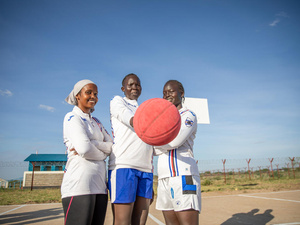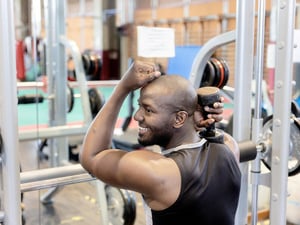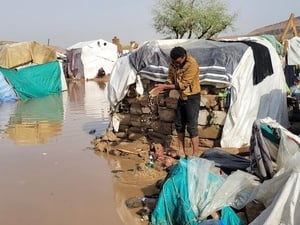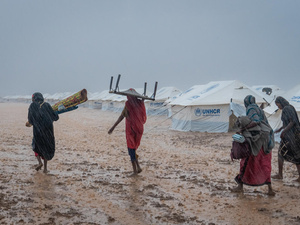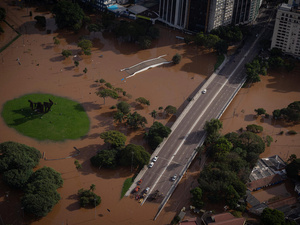Former embassy now home to desperate Somalis in Rome
Former embassy now home to desperate Somalis in Rome
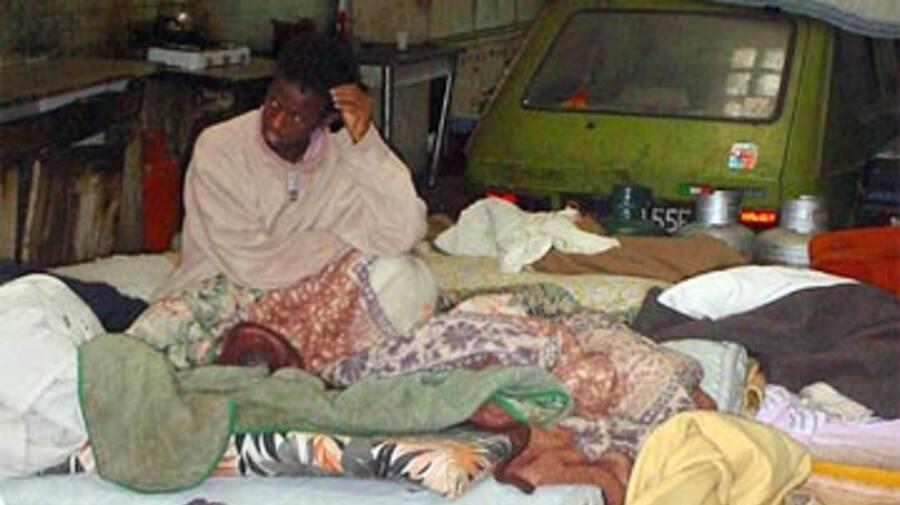
Poor living conditions for Somali asylum seekers at the former Somali embassy in Rome.
ROME, Nov 16 (UNHCR) - The neighbourhood is one of the most elegant in Rome, and the quiet street is full of greenery. Zeinab Ahmed Barahow is playing "hostess" in a building protected by a hedge and two large wrought-iron gates. Outside, a brass sign reads "Embassy of the Somali Democratic Republic".
But it is not exactly diplomats that Barahow, president of the Association of Emigrant Somali Women (ADSE), is entertaining on the borrowed premises of the former embassy. "Today, we've come to organise a party for the end of Ramadan, for all the people who live here," she explains, doling out food and drinks on Sunday to dozens of desperate Somali asylum seekers encamped in this compound in the Italian capital.
The Somali embassy on Via dei Villini closed in 1991 as the government in Mogadishu collapsed. The building has now fallen into disrepair, and its gardens have become a dumping ground for old cars that were once assigned to the diplomatic staff and that today are used for night-time shelter by those who have nowhere better to go.
Under the porch in the back, some 10 people sleep on cots, mattresses and filthy blankets. In the garage, which is now used as both a kitchen and a dormitory, there are more beds, mixed with gas cylinders, luggage and trash. The same situation can be seen in the basement, in total blackness, and in the rooms on the ground floor, where there are mattresses scattered all around. There is no electricity, and there is only one tap with cold water, and one bathroom for some 50 men living here.
"I left Somalia where people are being killed," says Farah, the skin of his face cracked and his body covered with boils, "only to end up here, where I don't even have the money to buy medicine. When I was in Norway, where I lived for seven months, my illness had subsided, but now that they sent me back to Italy and I live in these conditions, I am feeling very sick again."
The story of Farah - who arrived in Italy but went on to settle in another European Union country, from where he was sent back to Italy again - is similar to that of many other Somalis who are encamped at the former embassy, and who in bureaucratic jargon are called "Dublin cases". These are people who first sought asylum in Italy but, unable to survive because they lacked working rights and received no aid whatsoever, subsequently moved to other countries of the EU, where they re-applied for asylum.
Ever since Eurodac, the centralised system for keeping and comparing the fingerprints of all asylum applicants in the EU, took effect, it has become easier to apply the Dublin Convention, which establishes which country is responsible for examining an asylum application. The Convention has a dual purpose: to prevent a person applying for asylum in more than one EU country, but also to make sure it will not happen that all countries refuse to accept an asylum application, passing off the responsibility to others.
"In Sweden, I had a home, a health care card, and I was taking a course for carpenters. In the eight months I was there, I also learned a bit of the language, because a teacher gave us lessons twice a week," said another Somali asylum seeker, Sadin, aged 25. "Since the Swedish police sent me back to Italy, I have been sleeping here out in the open, in a place without electricity or hot water."
As early as in 2000, some people had started spending a few nights at the former embassy before moving on to other countries. But since last year, the building has become "Dublin House", a permanent abode for those who have been sent back to Italy from other European countries. In the former embassy's current state of degradation - even more striking in the middle of an elegant neighbourhood - fights often break out at night over a blanket or a sleeping spot inside the garage.
"Our youths have grown up with war," remembers Barahow bitterly. "Sometimes I no longer recognise my people in them. They are blank and distant, without respect for elders, and aggressive."
Along with the food and drinks, the women of the ADSE also brought Zahra, a gaunt and frightened-looking woman of 28, to Sunday's party. They presented her case with great concern. Zahra left Mogadishu when she was already in an advanced state of pregnancy, and during the journey, in the desert between Sudan and Libya, she went into labour. The childbirth, without any assistance, resulted in severe complications, and the baby girl suffered brain damage.
After arriving on the Italian island of Lampedusa from Libya in June 2003, Zahra and little Inan were first transferred to the hospital in Palermo, Sicily, where they remained for six months, and then to the Roman children's hospital, Bambin Gesù. The diagnosis was "spastic tetraparesis". For about a year now, Zahra has been sleeping in a chair next to Inan at the hospital, and she has nowhere to call home, where she can set down her few belongings and rest.
"The woman is extremely exhausted," says Barahow, "and we haven't been able to find accommodations for her. What is more, she is awaiting the Commission's response on the recognition of her refugee status, and this creates great anxiety for her, because she is fearful of a negative outcome."
Anxiety seems common among all those who live in the building on Via dei Villini. "The Commission has decided that I can remain in Italy for humanitarian reasons, but the Police Headquarters of Rome will not issue me a residence permit because I do not have a fixed address," laments Abdul, 21, who has been a guest at "Dublin House" several times now. "But how can I find a home if I do not have the right to work and can't earn any money?"
Many other youths are in Abdul's situation, and they are all exasperated by the impasse in which they find themselves and the terrible conditions in which they live.
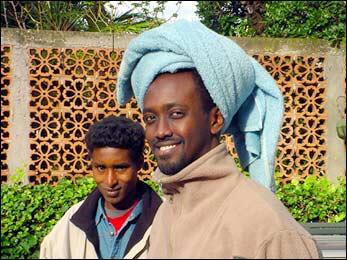
Somali asylum seekers at the former Somali embassy in Rome.
"Our association collected €1,000 among the African women and we bought a gas cooker and food for those who live here," says Barahow. "The most important thing, however, is to re-educate these youths, who have grown up amidst the violence of war. But to do this we need to give them hope for the future."
UNHCR is currently negotiating with the municipality of Rome to find an alternative shelter for the inhabitants of the former Somali embassy. The agency is also in talks with the police authorities to break the legislative impasse, urging them to issue residence permits so that the desperate asylum seekers can find work and hopefully a place to call home.
By Laura Boldrini
UNHCR Italy


